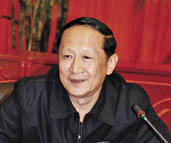| Voice of the People
By staff reporter ZHANG HUA
HOW are CPPCC proposals initiated and handled? How significant are they to the development of China? Does the Subcommittee for Handling Proposals under the National Committee of the Chinese People's Political Consultative Conference (CPPCC) have cooperation and exchange programs with its foreign counterparts? How does the subcommittee line up its future tasks? These were the major questions this reporter had in mind when interviewing Li Tielin, member of the Standing Committee of the CPPCC National Committee and director of its Subcommittee for Handling Proposals.
 |
|
Li Tielin, director of the CPPCC Subcommittee for Handling Proposals. |
Working the Process: Listening
"More often than not I'll be moved by the true emotions I can read between the lines; often proposers have invested much in verbalizing the results of what they have seen, heard and actually experienced," says Director Li. "These proposals reflect the devotion and commitment of CPPCC members, the central committees of various democratic parties, All-China Federation of Industry and Commerce, relevant people's organizations, and CPPCC special committees. Many of these proposals and suggestions have been included in relevant state policies and development plans, or adopted by related government departments."
The subcommittee has always given precedence to issues that are directly related to people's lives; in fact one of its main functions is to facilitate the solution of issues of greatest concern and interest to the populace. To show how his committee works, Li Tielin labored over his explanation.
Around New Year's Day every year, the subcommittee solicits proposals by letter from all the CPPCC members, together with a copy of reference proposals. By this point, Li and his people have made massive preparations. For instance, they have approached various state departments and functionaries to study their major tasks, key issues and the current problems involved, for the compilation of the reference proposals. This routine is essential to inspiring practical, substantial and well-targeted submissions.
| 